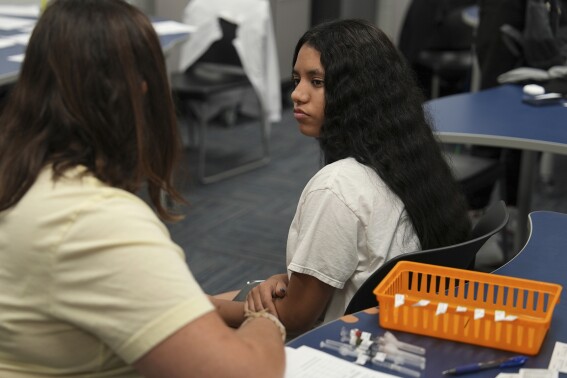McALLEN, Texas (AP) — For three days, the staff of an Orlando medical clinic encouraged a woman with abdominal pain who called the triage line to go to the hospital. She resisted, scared of a 2023 Florida law that required hospitals to ask whether a patient was in the U.S. with legal permission.
The clinic had worked hard to explain the limits of the law, which was part of Gov. Ron DeSantis’ sweeping package of tighter immigration policies. The clinic posted signs and counseled patients: They could decline to answer the question and still receive care. Individual, identifying information wouldn’t be reported to the state.
“We tried to explain this again and again and again, but the fear was real,” Grace Medical Home CEO Stephanie Garris said, adding the woman finally did go to an emergency room for treatment.
Texas will be the next to try a similar law for hospitals enrolled in state health plans, Medicaid and the Children’s Health Insurance Program. It takes effect Nov. 1 — just before the end of a presidential election in which immigration is a key topic.
“Texans should not have to shoulder the burden of financially supporting medical care for illegal immigrants,” Texas Republican Gov. Greg Abbott said in a statement announcing his mandate, which differs from Florida’s in that providers don’t have to tell patients their status won’t be shared with authorities.
Both states have high numbers of immigrants, ranging from people who are in the U.S. without legal permission to people who have pending asylum cases or are part of mixed-status families. And while the medically uninsured rate in these two states — neither of which have expanded Medicaid — are higher than the national average, research has shown immigrants tend to use less and spend less on health care.
Texas and Florida have a long history of challenging the federal government’s immigration policies by passing their own. And their Republican leaders say the hospital laws counter what they see as lax enforcement at the border by the Biden administration — though Florida’s early data is, by its own admission, limited.
Florida GOP state Sen. Blaise Ingoglia, who sponsored the hospital bill, said in a written statement that the law is “the strongest, and most comprehensive state-led, anti-ILLEGAL immigration law,” but did not respond to The Associated Press’ questions about the impact of the law on the immigrant community or on hospital patients.
Luis Isea, an internal medicine doctor with patients in hospitals and clinics in central Florida, said the law “is creating that extra barrier” for patients who are already exposed to many disparities.
Immigrant advocate groups in Florida said they sent thousands of text messages and emails and held clinics to help people understand the limitations of the law — including that law enforcement agencies wouldn’t know an individual’s status because the data would be reported in aggregate.
But many outreach calls from health workers went unanswered. Some patients said they were leaving Florida, as a result of the law’s impact on getting health care and on employment; the DeSantis’ administration tied the hospital mandate to other initiatives that invalidated some driver’s licenses, criminalized transportation of migrants lacking permanent status and changed employment verification policies.
Others, advocates say, languished in pain or needed to be persuaded. Verónica Robleto, program director at the Rural Women’s Health Project in north central Florida, fielded a call before the law took effect in July 2023 from a young woman who didn’t have legal permission to be in the U.S. and was afraid she would be separated from her child if she gave birth at the hospital.
“She was very afraid (but) she did end up going after speaking with me,” Robleto said.
Whatever data Florida and Texas do collect likely will be unreliable for several reasons, researchers suggested. Health economist Paul Keckley said the report released by Florida state officials could have “incomplete or inaccurate or misleading” data.
For one, it’s self-reported. Anyone can decline to answer, an option chosen by nearly 8% of people admitted to the hospital and about 7% of people who went to the emergency room from June to December 2023, the Florida state report said. Fewer than 1% of people who went to the emergency room or were admitted to the hospital reported being in the U.S. “illegally.”
The Florida Agency for Health Care Administration acknowledged large limitations in their analysis, saying it didn’t know how much of the care provided to “illegal aliens” went unpaid. It also said it was unable to link high levels of uncompensated care with the level of “illegal aliens” coming to a hospital, saying it’s “more associated with rural county status than illegal immigration percentages.”
The agency didn’t immediately respond to requests for comment and more information. Its report noted that for much of the last decade, the amount of unpaid bills and uncollected debts held by Florida hospitals has declined.
In Florida and in Texas, people who aren’t in the U.S. legally can’t enroll in Medicaid, which provides health insurance for low-income people — except in the case of a medical emergency.
Multiple factors can affect the cost of care for people who are in the U.S. without legal permission, experts said, especially the lack of preventive care. That’s especially true for people who have progressive diseases like cancer, said Dr. James W. Castillo II, the health authority for Cameron County, Texas, which has about 22% of the population uninsured compared to the state average of 16.6%.
At that point, he said, “it’s usually much harder to treat, much more expensive to treat.”
Texas community groups, policymakers and immigration attorneys are partnering with Every Texan, a nonprofit focusing on public policy and health care access, to encourage people to not answer the status question, said Lynn Cowles with Every Texan.
And in Florida, the deportation fears are subsiding but questions about the purpose of the law remain.
“How much of this is substantive policy and good policy versus how that fared, I leave that for others to speculate,” said Garris with the Orlando clinic. “But I know the practical effect of the law was egregious and demeaning to patients who are living here, working here. It’s just insulting.”
___
Salomon reported from Miami, and Shastri reported from Milwaukee.
___
The Associated Press Health and Science Department receives support from the Robert Wood Johnson Foundation. The AP is solely responsible for all content.
Salomon is a Miami-based reporter who covers Latin America and immigration affairs for The Associated Press.Salomon es una periodista que desde Miami cubre asuntos latinoamericanos y de inmigracion. Shastri is a public health reporter for The Associated Press, based in Milwaukee. She covers housing access, the social safety net, medical misinformation and other topics that influence the health of communities broadly.
Disclaimer: The copyright of this article belongs to the original author. Reposting this article is solely for the purpose of information dissemination and does not constitute any investment advice. If there is any infringement, please contact us immediately. We will make corrections or deletions as necessary. Thank you.




